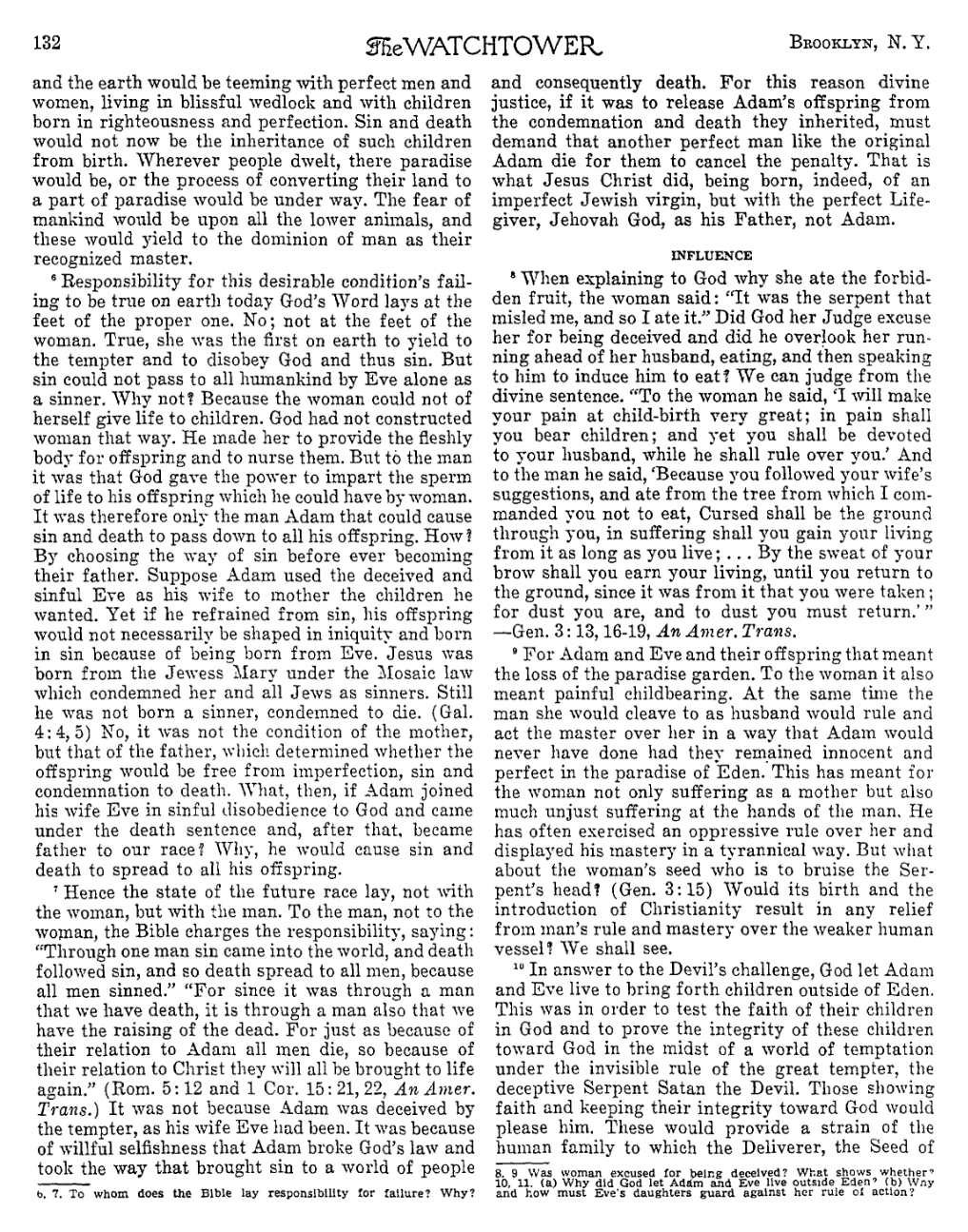INFLUE." ' l 'CE S When explaining to God why she ate the forbid- den fruit, the woman said: "It was the serpent that misled me, and so I ate it." Did God her Judge excuse her for being deceived and did he over~ook her run- ning ahead of her husband, eating, and then speaking to him to induce him to eaH We can judge from the divine sentence. "To the woman he said, 'I will make your pain at child-birth very great; in pain shall you bear children; and yet you shall be devoted to your husband, while he shall rule over you.' And to the man he said, 'Because you followed your wife's suggestions, and ate from the tree from which I com- manded you not to eat, Cursed shall be the ground through you, in suffering shall you gain your living from it as long as you live; ... By the sweat of your brow shall you earn your living, until you return to the ground, since it was from it that you were taken; for dust you are, and to dust you must return:" -Gen. 3: 13, 16-19, An Amer. Tmns. 9 For Adam and Eve and their offspring that meant the loss of the paradise garden. To the woman it also meant painful childbearing. At the same time the man she would cleave to as husband would rule and act the master over her in a way that Adam would never have done had they remained innocent and perfect in the paradise of "Eden: This has meant fol' the woman not only suffering as a mother but also much unjust suffering at the hands of the man. He has often exercised an oppressive rule over her and displayed his mastery in a tyrannical way. But what about the woman's seed who is to bruise the Ser- pent's head' (Gen. 3: 15) Would its birth and the introduction of Christianity result in any relief from man's rule and mastery over the weaker human vessel ~ Ve shall see. 10 In answer to the Devil's challenge, God let Adam and Eve live to bring forth children outside of Eden. This was in order to test the faith of their children in God and to prove the integrity of these children toward God in the midst of a world of temptation under the invisible rule of the great tempter, the deceptive Serpent Satan the Devil. Those showing faith and keeping their integrity toward God would please him. These would provide a strain of the human family to which the Deliverer, the Seed of 8. 9 Was woman excused tor gelng deceived? What shows whether" 10, 11. (a) Why did God let Adam and Eve Ilve outSide Eden" (b) Wny and how must Eve's daughters guard against her rule 01 act1on'l
Această pagină nu a fost verificată
132
Turnul de Veghe
Brooklyn, N.Y.
iar pământul ar fi plin de bărbați și femei perfecți, care trăiesc în căsătorie fericită și cu copii născuți în dreptate și perfecțiune. Păcatul și moartea nu ar fi acum moștenirea unor astfel de copii de la nastere. Nicăieri locuiau oameni, acolo paradis ar fi, sau procesul de convertire a pământului lor în o parte din paradis ar fi în curs de desfășurare. Frica de omenire ar fi peste animalele inferioare și acestea ar ceda dominație omului recunoscându-l ca stăpân al lor.
6 Responsabilitatea pentru că această condiție dezirabilă nu este adevărată pe pământ astăzi Cuvântul lui Dumnezeu o așează la picioarele celui potrivit. Nu; nu la picioarele femeii. Adevărat, ea a fost prima de pe pământ care a cedat ispititorului și nu a ascultat de Dumnezeu și astfel a păcătuit. Dar păcatul nu a putut trece la toată omenirea numai prin Eva ca persoană păcătoasă. De ce nu? Pentru că femeia singură nu putea să dea viață copiilor. Dumnezeu nu construise astfel femeia. El a făcut-o să asigure corpul trupesc descendenților și să-i alăpteze. Dar bărbatului, Dumnezeu a dat puterea de a împărtăși sămânța vieții descendenților săi pe care ar putea să-i aibă de femeie. Prin urmare, numai omul Adam a putut face ca păcatul și moartea să se transmită tuturor descendenților săi. Cum? Alegând calea păcatului înainte de a deveni vreodată tatăl lor. Să presupunem că Adam a folosit pe înșelata și păcătoasa Eva ca soție pentru a-și avea copiii pe care i-a dorit. Totuși, dacă s-ar fi abținut de la păcat, descendenții săi nu ar fi neapărat modelați în nelegiuire și născuți în păcat din cauza faptului că s-au născut din Eva. Iisus s-a născut din evreica Maria sub legea mozaică care a condamnat-o pe ea și pe toți evreii ca păcătoși. Totuși nu s-a născut păcătos, condamnat la moarte. (Gal. 4: 4, 5) Nu, nu starea mamei, ci cea a tatălui, a determinat dacă urmașii vor fi liberi de imperfecțiuni, pacat și condamnare la moarte. Ce se întâmplă atunci, dacă Adam s-a alăturat soției sale Eva în neascultarea păcătoasă față de Dumnezeu și a fost condamnat la moarte și, după aceea, a deveni tatăl rasei noastre? De ce ar face el ca păcatul și moartea să se răspândească la toți descendenții săi.
și în consecință, moartea. Din acest motiv, dreptatea divină, dacă ar fi trebuit să-i elibereze pe urmașii lui Adam de condamnarea și moartea pe care au moștenit-o, trebuie să ceară unui alt om perfect ca Adamul original să moară pentru ca ei pentru a anula pedeapsa. Așa a făcut Isus Cristos, fiind născut, într-adevăr, dintr-o fecioară evreiască imperfectă, dar cu Dătătorul de viață perfect, Iehova Dumnezeu, ca Tatăl său, nu Adam.
{{{2}}}
